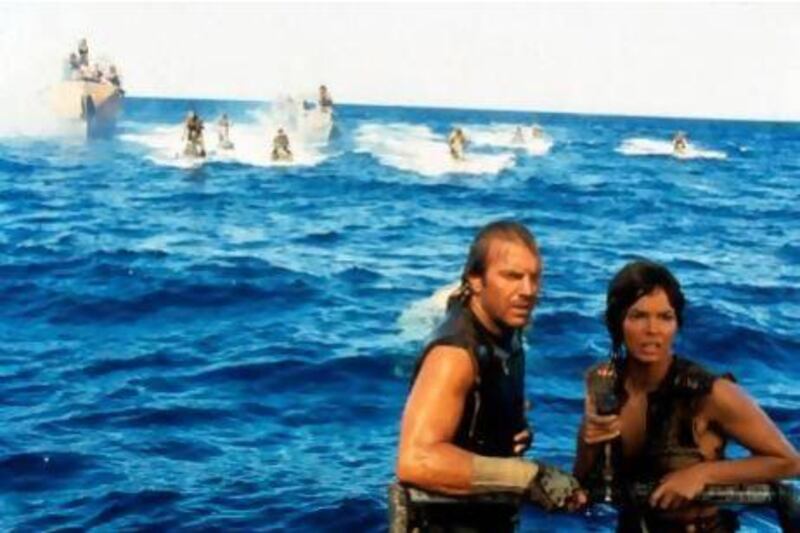The zombie apocalypse is one thing. But dealing with a "problem" film is far more likely to have Hollywood studio executives running scared. In the case of World War Z, however, it looks as if Paramount Studios might just have pulled off a minor miracle, turning a US$200 million (Dh735m) flop-in-waiting back into the blockbuster it set out to be. The Brad Pitt-starrer, based on Max Brooks's 2006 novel about a zombie plague that sweeps the planet, has been getting bad word-of-mouth ever since the studio bumped its release date from December to June. While a pushback is not unusual – and, as in the recent hit The Great Gatsby, sometimes can prove beneficial – the fallout surrounding the World War Z shoot was farcical.
“A nightmare from top to bottom” was how one source described the production to The Hollywood Reporter – with some suggesting the film had no leadership or creative direction even before the shoot began in June 2011. With just weeks to go before the first day of shooting, critical decisions on things such as how the zombies would move were still to be made, suggesting that the director Marc Forster (Quantum of Solace) was out of his depth.
Filming in England, Scotland and Malta, initially on a budget of $125 million, the shoot really began to unravel when the production moved to Budapest. In particular, when a Hungarian antiterrorism unit raided an airport warehouse, confiscating 85 fully functional automatic assault rifles that were to be used during the filming (it’s illegal to transport such working weapons into the country).
Reportedly, the incident infuriated Pitt, whose company Plan B is onboard as the co-producers. Meanwhile, Paramount executives were said to be unhappy when they saw early footage of Pitt's character, the former UN investigator Gerry Lane, looking gaunt – hardly a selling point to his female fans. The studio then took the drastic step of bringing in Damon Lindelof (Prometheus) and Drew Goddard (The Cabin in the Woods) to rework the third act.
With the budget suddenly skyrocketing, it meant five weeks of reshoots and a delayed release date. "There are always tensions and it's always hard to handle them," Forster told FilmInk magazine. "But it's false reporting that there was a breakdown of communication. We did do the reshoot with the studio's blessing, because we felt it was a much better ending. So we pushed the release date and did the reshoot in total agreement." Yet amid all this chaos, it seems Forster and Pitt have rescued World War Z – with early buzz suggesting it may yet pull off a $40-$50 million opening weekend in the US. Pitt played his part, introducing four sneak screenings in four different cities in one day earlier this month to help generate positive word-of-mouth. The studio even countered the negative news by co-operating on a Vanity Fair article tracing the film's turbulent history.
What it shows is that “bad press” blockbusters don’t always tank. This year has already seen another Paramount film, sequel GI Joe: Retaliation, beat the odds, raking in $369 million worldwide. This came despite a pushed-back release date – which the studio initially claimed was to accommodate the addition of 3-D visuals (it later emerged it was for reshoots).
Indeed, film history is littered with flops that never were (see panel) – films as diverse as Gone With the Wind and Gangs of New York where on-set clashes or bad PR aren't enough to derail a box-office behemoth. Only time will tell whether World War Z manages to conjure a great escape, but given Pitt spends the film trying to save the world, it'll feel apt if it does.
• World War Z opens in UAE cinemas today
Five 'bombs' that never went off
Gone With the Wind (1939)
• Budget: $3.9m; worldwide gross: $390 million
It’s now an Oscar-winning film so classic it’s been selected to be preserved by the US National Film Registry. But its production history proved almost as epic as the film itself – with the original director George Cukor fired after filming began only to be replaced by Victor Fleming and (briefly) Sam Wood, after Fleming walked off the shoot after a nervous breakdown.
Hook (1991)
• Budget: $70m; worldwide gross: $301m
Running 40 days over schedule, with the director Steven Spielberg finding it difficult to work with his star Julia Roberts, the negative spin came early on this Peter Pan adaptation. "Hook [is] the rare Spielberg flop," Time magazine declared, as the poor reviews poured in. Yet somebody clearly forgot to tell audiences, buoyed by the lure of Spielberg magic.
Waterworld (1995)
• Budget: $175m; worldwide gross: $264m
Joss Whedon, flown out to do last-minute rewrites, called it "seven weeks of hell". But despite cast and crew illnesses, a set-destroying hurricane and clashing egos, the Kevin Costner-produced post-apocalyptic drama didn't sink. "Some people think Waterworld was a flop, which it wasn't," reflected Costner. "It was one of the
most financially successful movies that Universal has."
Gangs of New York (2002)
• Budget: $100m; worldwide gross: $193m
Martin Scorsese’s long-gestating 19th-century-set gangland drama was plagued by on-set reports of clashes between the director and the Miramax head at the time, Harvey Weinstein, who demanded cuts. Delays also helped escalate the budget, while Scorsese was also said to be at loggerheads with his star, Leonardo DiCaprio. Whatever the truth, the film doubled its budget and gained 10 Oscar nominations.
The Bourne Identity (2002)
• Budget: $60m; worldwide gross: $214m
Doug Liman’s adaptation of the Robert Ludlum novel about an amnesiac assassin “had all the signals of being a disaster, because we [re]shot so many times and it was delayed, like, a year coming out,” noted its star Matt Damon. It just shows how wrong you can be – with the film spawning a game-changing franchise that has, to date, grossed $1.2 billion.
Follow us on Facebook for discussions, entertainment, reviews, wellness and news.
Follow us
[ @LifeNationalUAE ]





